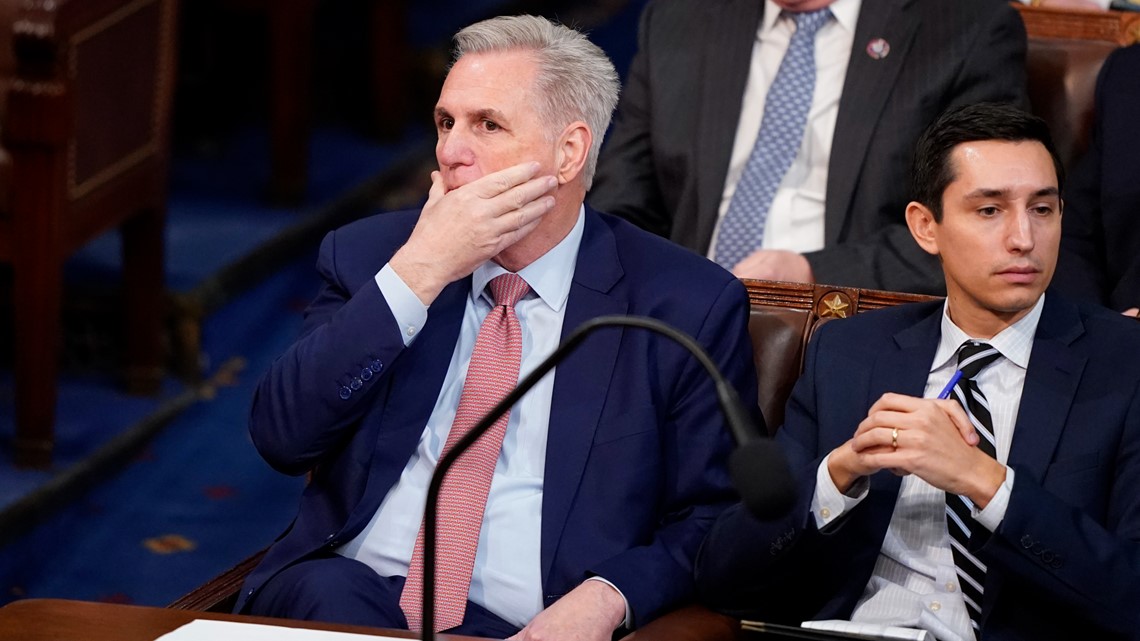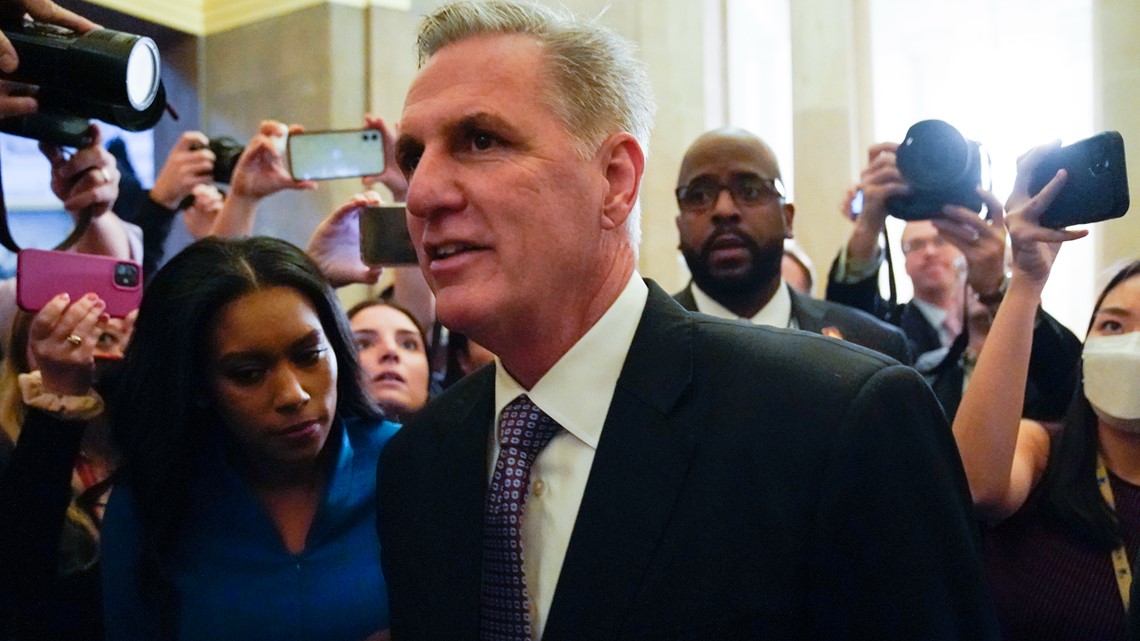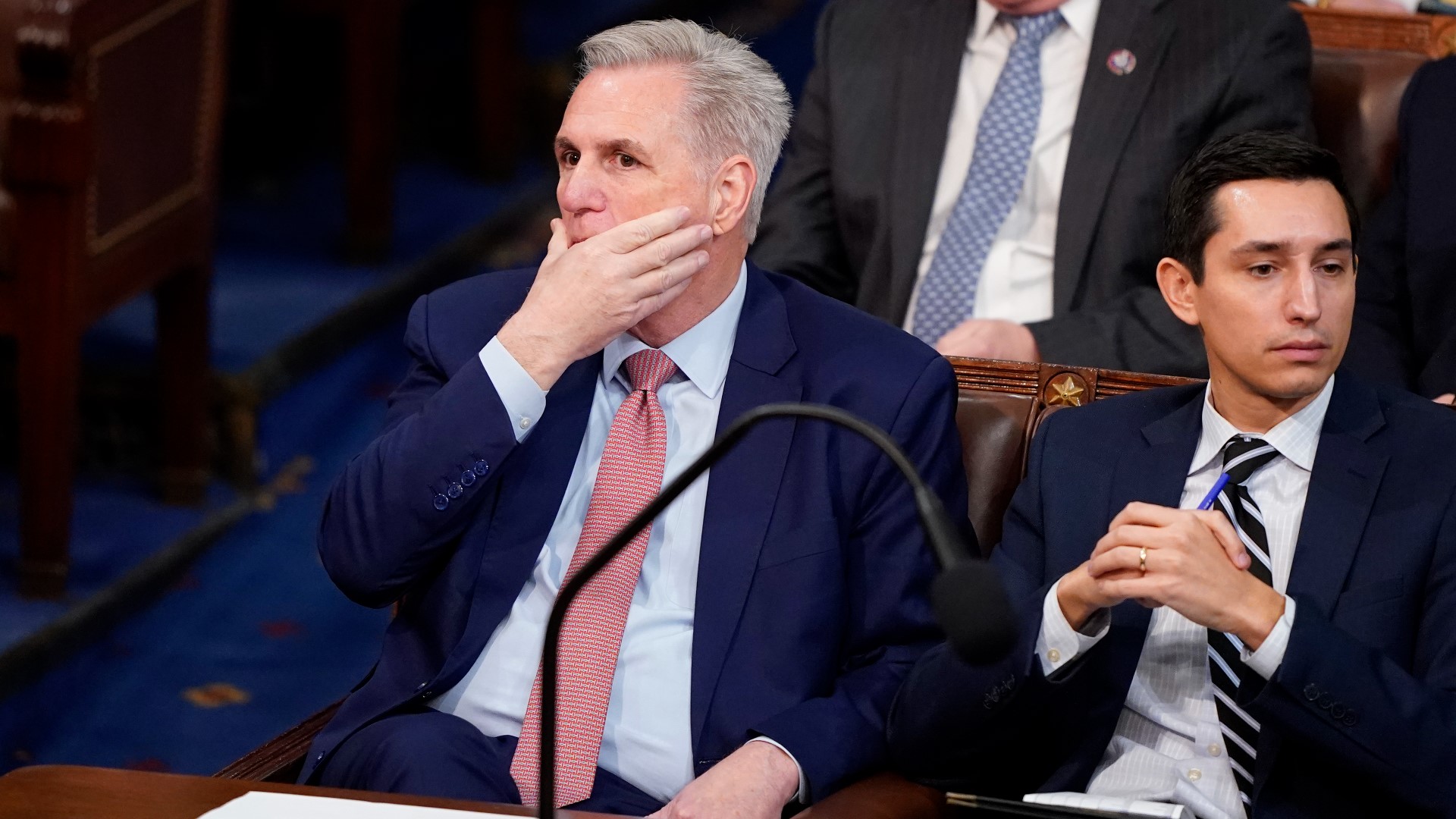WASHINGTON — House Republicans flailed through a long second day of fruitless balloting Wednesday, unable to either elect their leader Kevin McCarthy as House speaker or come up with a new strategy to end the political chaos that has tarnished the start of their new majority.
Yet McCarthy wasn’t giving up, even after the fourth, fifth and sixth votes produced no better outcome and he was left trying to call off a nighttime session. Even that was controversial, as the House voted 216-214 — amid shouting and crowding — to adjourn for the night.
“No deal yet,” McCarthy said shortly before that as he left a lengthy closed-door dinnertime meeting with key holdouts and his own allies. “But a lot of progress.”
No progress at all was evident though the day of vote after vote after vote as Republicans tried to elevate McCarthy into the top job. The ballots produced almost the same outcome, 20 conservative holdouts still refusing to support him and leaving him far short of the 218 typically needed to win the gavel.
In fact, McCarthy saw his support slip to 201, as one fellow Republican switched to vote simply present.
Seeing no quick way out of the political standoff, Republicans voted abruptly late in the day to adjourn for a few hours as they desperately searched for an endgame to the chaos of their own making. They were due back in the evening, but McCarthy wanted to take a break until Thursday.
“I think people need to work a little more,” McCarthy said. "I don’t think a vote tonight would make any difference. But a vote in the future could.”
McCarthy, the California Republican, vowed to fight to the finish for the speaker's job despite the grueling spectacle, unlike any in modern times, that threw the new majority into tumult for the first days of the new Congress. Animated private discussions broke out on the chamber floor and in huddled meetings throughout the Capitol between McCarthy supporters and detractors.


“Well, it’s Groundhog Day,” said Rep. Kat Cammack, R-Fla., in nominating McCarthy on the sixth ballot.
She said, “To all Americans watching right now, We hear you. And we will get through this — no matter how messy.”
But the right-flank conservatives, led by the Freedom Caucus and aligned with Donald Trump, appeared emboldened by the standoff — though Trump publicly backed McCarthy,
“This is actually an invigorating day for America,” said Rep. Byron Donalds, R-Fla., who was nominated three times by his conservative colleagues as an alternative. “There’s a lot of members in the chamber who want to have serious conversations about how we can bring this all to a close and elect a speaker.”
No other work could be done — swearing in new House members, forming committees, tackling legislation, investigating the Biden administration — until the speaker was elected.
As the hours churned, the dynamic proved no different from Day One, as Democrats re-upped their leader, Rep. Hakeem Jeffries, for speaker, and Donalds offered his challenge to McCarthy in another history-making moment. Both Jeffries and Donalds are Black.
“This country needs leadership,” said Rep. Chip Roy, a Texas Republican noting the first time in history two African Americans were nominated for the high office. Lawmakers from both parties rose to applaud.
It was the first time in 100 years that no nominee for House speaker could take the gavel on the first vote.
The disorganized start to the new Congress pointed to difficulties ahead with Republicans now in control of the House, much the way that some past Republican speakers, including John Boehner, had trouble leading a rebellious right flank and ended up with government shutdowns, standoffs and early retirement.
Democratic President Joe Biden, departing the White House for a bipartisan event in Kentucky with Senate GOP leader Mitch McConnell, said “the rest of the world is looking” at the scene on the House floor.
“I just think it’s really embarrassing it’s taking so long," Biden said. “I have no idea” who will prevail.
Tensions flared among the new House majority as their campaign promises of competent leadership stalled out. Not since 1923 had a speaker's election gone to multiple ballots. The longest and most grueling fight for the gavel started in late 1855 and dragged on for two months, with 133 ballots, during debates over slavery in the run-up to the Civil War.
A new generation of conservative Republicans, many aligned with Trump’s Make America Great Again agenda, want to upend business as usual in Washington, and were committed to stopping McCarthy’s rise without concessions to their priorities.
But even Trump's strongest supporters disagreed on this issue. Rep. Lauren Boebert, a firm Colorado conservative who nominated Donalds the second time, called on the former president to tell McCarthy, “Sir, you do not have the votes and it’s time to withdraw.'”
Earlier Wednesday, Trump had done the opposite, urging Republicans to vote for McCarthy. “Close the deal, take the victory," he wrote on his social media site, using all capital letters. “Do not turn a great triumph into a giant & embarrassing defeat.”
As the spectacle dragged on, McCarthy's backers implored the holdouts to fall in line for the California Republican.
“I do think members on both sides of this are getting a lot of pressure now,” said Rep. Tom Cole, R-Okla. “So I think the message from home is, ‘Hey, sort this stuff out.'”
The standoff over McCarthy has been building since Republicans won the House majority in the midterm elections, eager to end the past two years of Democratic control of Washington. The conservative Freedom Caucus led the opposition to McCarthy, believing he’s neither conservative enough nor tough enough to battle Democrats.
To win support, McCarthy has already agreed to many of the demands of Freedom Caucus members, who have been agitating for rules changes and other concessions that give rank-and-file members more influence.
And a McCarthy-aligned campaign group, the Conservative Leadership Fund, offered another concession, saying it would no longer spend money on elections “in any open-seat primaries in safe Republican districts." The far-right lawmakers complained their preferred candidates for the House were being treated unfairly as the campaign fund put its resources elsewhere.
But those opposing McCarthy do not all have the same complaints, and he may never be able to win some over.
“I'm ready to vote all night, all week, all month and never for that person,” said Rep. Matt Gaetz, R-Fla.
Such staunch opposition carried echoes of McCarthy's earlier bid for the job, when he dropped out of the speaker’s race in 2015 because he could not win over conservatives.
Democrats enthusiastically nominated and renominated their House leader, Jeffries, on all six ballots for speaker over the two days. He repeatedly won the most votes overall, 212.
If McCarthy could win 213 votes, and then persuade the remaining naysayers to simply vote present, he would be able to lower the threshold required under the rules to have the majority.
It's a strategy former House speakers, including outgoing Democratic Speaker Nancy Pelosi and Republican Boehner, had used when they confronted opposition, winning with fewer than 218 votes.
One Republican, Rep. Victoria Spartz of Indiana, voted present on Wednesday's rounds, but it only ended up lowering McCarthy's total.



